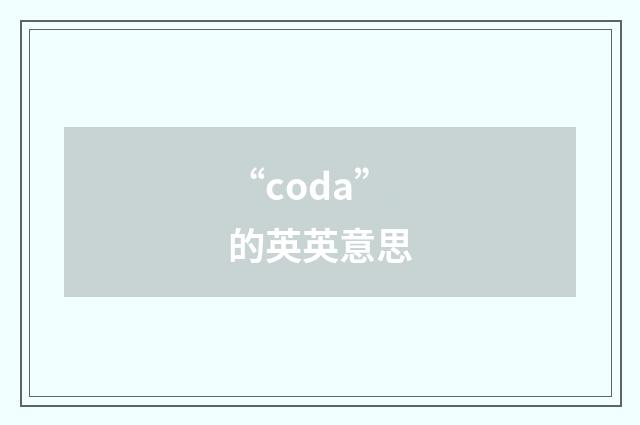| 单词 | coda |
| 释义 | ‖ coda|ˈkoda, ˈkəʊdə|
[Ital.:—L. cauda tail.]
1. Mus. A passage of more or less independent character introduced after the completion of the essential parts of a movement, so as to form a more definite and satisfactory conclusion. Also transf. and fig.
1753in Chambers Cycl. Suppl. 1815Europ. Mag. LXVIII. 154 The coda concludes the piece with spirit and energy. 1888Academy 21 Jan. 51/3 In the opening allegro we have..careful elaboration, and a highly effective coda. 1889Mrs. E. Lynn Linton Thro' Long Night i. i, The chapter of accidents has a long coda. 1908A. Bennett Old Wives' Tale I. i. ii. 26 The cups and saucers were left for Maggie to wash up as a fitting coda to Maggie's monthly holiday. 1963J. Wiesenfarth H. James v. 104 The coda beings in Chapter XII.
2. Ballet. (See quot. 1952.)
1922Beauclerk & Evrenov tr. Svetlov's Karsavina 33 The coda had to be altered and made easier for her. 1925Dancing Times Feb. 521/2 In the ‘pizzicato’, ‘adagio’ and ‘coda’..she showed what dancing should be. 1952Kersley & Sinclair Dict. Ballet Terms 37 Coda, 1. Used by critics and choreographers to indicate by relation to the music to which part of a ballet or dance they are referring. 2. The final concerted dance of a conventional pas de deux, pas de trois or pas de quatre.
¶ The sense ‘tail of a note’ is only Italian. |

英语词典包含277258条英英释义在线翻译词条,基本涵盖了全部常用单词的英英翻译及用法,是英语学习的有利工具。
相关内容11:
相关热词搜索:coda英英词典英英释义英语词汇意思用法释义英语
